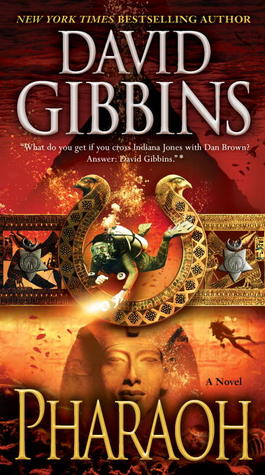For the longest time my adventure shelf has primarily consisted of Clive Cussler, Matthew Reilly, and James Rollins; with Will Adams, David Gibbins, Andy McDermott, and Paul Sussman patiently waiting their turn; and Alex Archer lurking on the next shelf, alongside all the Indiana Jones tie-in novels. These tattered paperbacks are my go-to adventures when I'm looking for an escape. They're the kind of books I insist on physically holding in my hands as I read, the texture of the paper akin to that of an old map, just waiting to lead me into history.

Based on my experiences this weekend, it's safe to say that most of those authors are going to have to remain patient, because David Gibbins just joined Clive Cussler as an absolute must-read. Seriously, Pharaoh was easily the most satisfying adventure tale I've read in a very long time, with Jack Howard standing proud next to Dirk Pitt.
Like Cussler, Gibbins is an experienced underwater archaeologist, and it definitely shows. Not only is there a sense of authenticity to his adventure, but also a level of detail that, quite honestly, astounds me. He manages to satisfy armchair archaeology geeks (such as myself) with enough detail to make us really feel a part of the action, but stops just shy of overwhelming the adventure junkies who simply want to get on with the story. It's a difficult balance, but it's what immediately sucked me into the early chapters.
Where Gibbins really excels, though, is in his grasp of history, and his ability to convey it. It's all too easy for an author to info-dump a bunch of historical facts on the reader in an effort to provide some sort of tenuous backbone for the novel's MacGuffin, but it's something else entirely to make the history a legitimate part of the story. Gibbins starts the novel off with a prologue of Ancient Egypt that is just as enticing and engrossing as Jack Howard's adventures, and then continues to weave in historical scenes throughout. More importantly, when Jack and his colleagues are talking history, it sounds like a natural (and interesting) conversation, not a strained attempt at narrative exposition.
As for the characters, there's a reasonably large cast here, but they're all well-developed and immediately identifiable. Jack Howard is a great protagonist, equal parts Indiana Jones and Dirk Pitt. He's both a scholar and an adventurer, as well as a business man and a family man. He's definitely a bit larger-than-life, but still easy to relate to. A big part of what makes him so human is his friendship with Costas, who is far more than just a literary sidekick. Even more interestingly, the historical figures who populate the side/back stories are well developed themselves, transforming what could have been tediously long departures from the primary storyline into engrossing tales of their own.
Finally - and this is key to any great adventure novel - the settings are fantastic. Whether we're under the sea or trudging through sand, gazing longingly at shipwrecks through a camera lens or getting down and dirty in a desert temple, there's enough of a 'wow' factor to keep any reader entertained. It's clear that Gibbins is always thinking with the camera's eye in mind, giving the reader the kind of cinematic scope and grandeur they'd expect to see on the screen, which definitely enhances the adventure.
I'm sure I haven't even begun to do the novel justice, but I'm still processing it all, and wanted to get a review drafted before diving into the lengthy author's notes as the back. As first impressions go, this was an amazing ride, one that kept me reading long after I should have turned the lights out and gone to bed. I am already anxious to give Gibbins a read again, which is probably the best recommendation I can give for Pharaoh.
Paperback, 400 pages
Published October 1st 2013 by Dell (first published May 23rd 2013)




